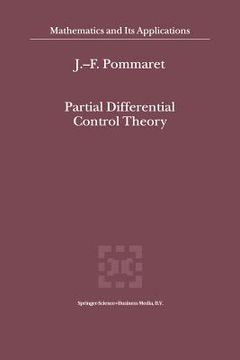Share
Partial Differential Control Theory: Volume I: Mathematical Tools, Volume II: Control System (in English)
J. F. Pommaret
(Author)
·
Springer
· Paperback
Partial Differential Control Theory: Volume I: Mathematical Tools, Volume II: Control System (in English) - Pommaret, J. F.
$ 208.41
$ 219.99
You save: $ 11.58
Choose the list to add your product or create one New List
✓ Product added successfully to the Wishlist.
Go to My WishlistsIt will be shipped from our warehouse between
Tuesday, July 09 and
Wednesday, July 10.
You will receive it anywhere in United States between 1 and 3 business days after shipment.
Synopsis "Partial Differential Control Theory: Volume I: Mathematical Tools, Volume II: Control System (in English)"
The mathematical theory of "open" dynamical systems is a creation of the twentieth century. Its humble beginnings focused on ideas of Laplace transforms applied to linear problems of automatic control and to the analysis and synthesis of electrical circuits. However during the second half of the century, it flowered into a field based on an array of sophisticated mathematical concepts and techniques from algebra, nonlinear analysis and differential geometry. The central notion is that of a dynamical system that exchanges matter, energy, or information with its surroundings, i.e. an "open" dynamical system. The mathema- tization of this notion evolved considerably over the years. The early development centered around the input/output point of view and led to important results, particularly in controller design. Thinking about open systems as a "black box" that accepts stimuli and produces responses has had a wide influence also in areas outside engineering, for example in biology, psychology, and economics. In the early 1960's, especially through the work of Kalman, input/state/output models came in vogue. This model class accommodates very nicely the internal initial conditions that are essentially always present in a dynamical system. The introduction of input/state/output models led to a tempestuous development that made systems and control into a mature discipline with a wide range of concepts, results, algorithms, and applications.
- 0% (0)
- 0% (0)
- 0% (0)
- 0% (0)
- 0% (0)
All books in our catalog are Original.
The book is written in English.
The binding of this edition is Paperback.
✓ Producto agregado correctamente al carro, Ir a Pagar.

